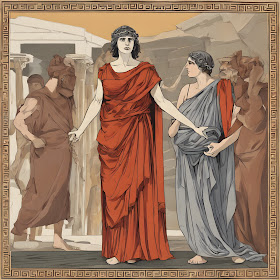Background and Context of Antigone
Among Sophocles' many works, ''Antigone'' stands out as a testament to his unparalleled storytelling and profound exploration of human nature. Written around 441 BC, ''Antigone'' is the third of play in the Theban Plays series, following ''Oedipus Rex'' and ''Oedipus at Colonus.'' The play revolves around the tragic story of Antigone, a young woman who defies the king's decree in order to give her brother a proper burial.
Set in the aftermath of a bloody civil war in Thebes, ''Antigone'' delves into themes of morality, loyalty, and the clash between personal convictions and the laws of the state. Sophocles skillfully weaves elements together, creating a compelling narrative that continues to resonate with audiences today.
Analysis of the Themes in Antigone
One of the central themes in ''Antigone'' is the conflict between divine law and human law. Antigone's decision to bury her brother, Polynices, against the king's orders reflects her unwavering belief in the importance of honouring family and the gods. This clash between personal values and societal norms raises profound questions about the nature of justice and the limits of obedience.
Another significant theme in the play is the role of gender in society. Antigone's defiance of the king's authority challenges traditional gender roles and highlights the power dynamics between men and women. Through Antigone's actions, Sophocles explores the notion of female agency and the consequences of defying established norms.
Additionally, ''Antigone'' explores the concept of fate and the tragic nature of human existence. The play is deeply rooted in the Greek belief in the inevitability of destiny. The predetermined roles that Antigone and the other characters play in the tragedy are what bind them together, highlighting the profound influence of fate on their lives.
Examination of the Characters in Antigone
The characters in ''Antigone'' are richly developed and play vital roles in driving the plot forward. Antigone herself as a courageous and headstrong young woman who is willing to sacrifice everything for her beliefs. Her determination makes her a powerful symbol of rebellion against unjust authority.
Creon, the king of Thebes, serves as the antagonist in the play. Initially portrayed as a strong and authoritative leader, Creon's relentless pursuit of power and disregard for divine law ultimately led to his downfall. His tragic flaw lies in his inability to recognise the limits of his authority and the importance of empathy and compassion.
Ismene, Antigone's sister, represents the voice of reason and caution. Unlike her sister, Ismene is unwilling to challenge the king's decree, fearing the consequences of disobedience. Through Ismene, Sophocles explores the complexities of loyalty and the conflict of personal convictions and the desire for self-preservation.
Famous Quotes and Lines in Antigone
Antigone: But I shall bury him. And if I have to die for this pure crime, I am content, for I shall rest beside him; His love will answer mine. I have to please the dead far longer than I need to please the living;
Haemon: No marriage shall be thought of as a greater prize for me to win than your good government.
Chorus: Too late, too late you see the path of wisdom.
Other Notable Works of Sophocles
In addition to ''Antigone,'' Sophocles penned numerous other plays that have stood the test of time. Among his notable works are ''Oedipus Rex,'' a tragic masterpiece that delves into the themes of fate and free will, and ''Electra,'' a gripping tale of revenge and justice.
Conclusion
Sophocles' ''Antigone'' remains a masterpiece of ancient Greek literature, captivating readers and audiences with its timeless themes and compelling characters, Through his exploration of morality, gender, and the clash between personal beliefs and societal norms, Sophocles invites us to reflect on the complexities of the human condition. As we unravel the genius of Sophocles, we gain a deeper understanding of the universal truths that continue to resonate in our modern world.
If you find this article insightful, please consider sharing it on your social media by clicking the social media icons below. Thank you for any support!!!
Relevant Articles
References
YouTube

No comments:
Post a Comment